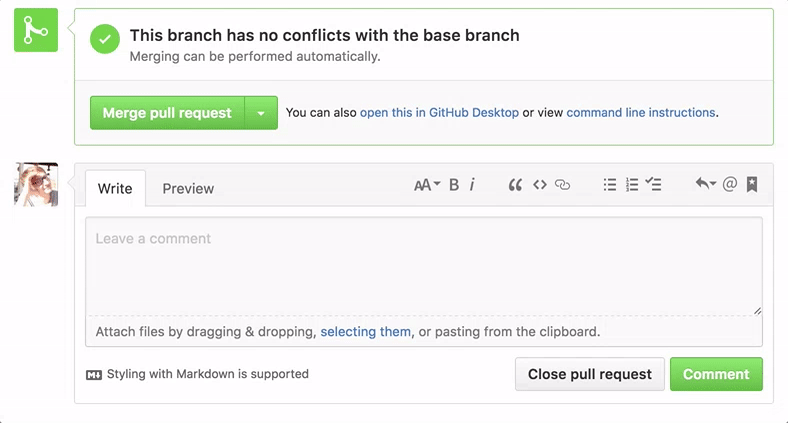Ok so I an contributing to a project on github. The project on github is upstream, my forked repo on github is origin, and my local repo on my computer.
git checkout -b feature # Working on feature git commit -a -m 'only commit on feature' then I submit a pull request
git push origin master The pull request is reviewed and a unrelated change needs to be made. Someone else makes a commit and merge into upstream/master
Now I am asked by the upstream maintainer to "rebase my pull request on top of master"
This is my story (insert Law and Order sound effect).....
I did not make any changes to the pull request and its still the same commit on branch feature.
git checkout master git fetch upstream git checkout feature git rebase master => "Current branch feature is up to date." git push origin feature => "Everything up-to-date" I don't understand. How is this possible when I know that someone committed and merged to upstream/master after I pushed my pull request to origin/feature?
Can anyone tell me what the correct procedure should be in this situation?
To update by rebasing, click the drop down menu next to the Update Branch button, click Update with rebase, and then click Rebase branch. Previously, Update branch performed a traditional merge that always resulted in a merge commit in your pull request branch.
If this is the situation, the only way to push the rebase of a GitHub master branch is to issue a pull request and have an administrator with elevated permissions perform the merge. If branch permissions don't exist, the –force switch on the push will be sufficient to have your GitHub rebase accepted.
You only show a fetch on the upstream repo. That doesn't actually update any of your local branches. It only updates your knowledge of upstream. You'd need to ensure upstream/master is fully merged into your master, like with a git pull, prior to rebasing onto master, or more simply just rebase onto upstream/master.
I.e:
git checkout master git pull upstream master git checkout feature git rebase master or
git checkout feature git rebase upstream/master Update:
After fixing your local feature branch, you'll need to push it back to origin to finish updating the pull request. Since you've pushed feature once already, you can't simply push again because a rebase changes history, and it's no long a fast-forward. Normally, whan a push fails with a "non-fast-forward", you'd resolve it by doing a pull, but a pull will just combine the two divergent histories, which is definitely not what you want. That would mean your old (pre rebase) feature branch would be combined with the new (post rebase) one. You want to overwrite origin/feature with the state of the new feature branch, dumping any record of the old one. That means you'll want to force the push to happen, even though it's not a fast-forward, using git push -f origin feature. Note: force pushing is dangerous, and you can lose commits with it. Only use it if you're absolutely sure you know what you're doing, like right here, where you intentionally want to drop the old, useless commits in the pre-rebase feature branch.
Now I am asked by the upstream maintainer to "rebase my pull request on top of master"
Note that since Sept. 2016, the maintainer can trigger the rebase himself/herself.
See "Rebase and merge pull requests"
When you select the new "Rebase and merge" option, the commits from the pull request's branch are rebased on to the tip of the base branch, and then the base branch itself is fast forwarded to this newly rebased head. Rebases automatically set the committer of the rebased commits to the current user, while keeping authorship information intact. The pull request's branch will not be modified by this operation.
If a rebase can't be performed due to conflicts, we'll let you know so you can manually resolve them as necessary.

If you love us? You can donate to us via Paypal or buy me a coffee so we can maintain and grow! Thank you!
Donate Us With